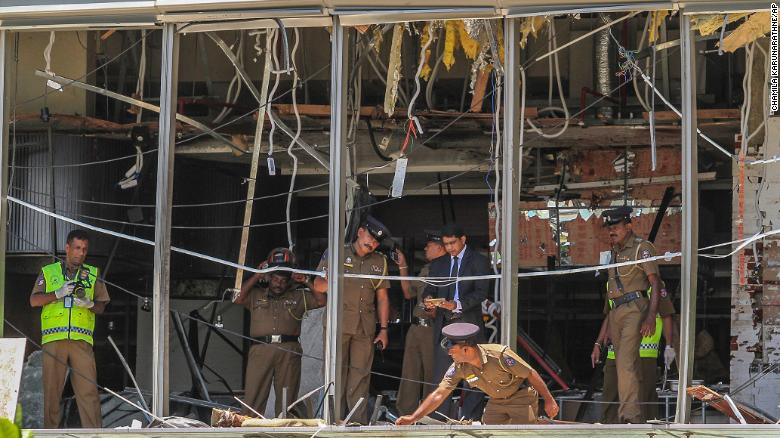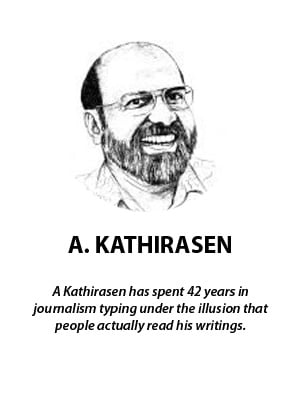A Brief Colonial History Of Ceylon(SriLanka)
Sri Lanka: One Island Two Nations
A Brief Colonial History Of Ceylon(SriLanka)
Sri Lanka: One Island Two Nations
(Full Story)
Search This Blog
Back to 500BC.
==========================
Thiranjala Weerasinghe sj.- One Island Two Nations
?????????????????????????????????????????????????Thursday, May 2, 2019
The lesson from Sri Lanka: Be wary of radical preachers


Sometimes, I admit, we fail to appreciate the good work done by the
police. Certainly there are corrupt policemen, and officers who abuse
their powers; certainly there are officers who are unprofessional and
politicised. And certainly the police force can do much more to curb
crime.
But, on the whole, most of them carry out their duties well enough to keep us safe, especially from terrorist attacks.
This needs to be appreciated even more in the wake of the terrorist
bombings in Sri Lanka that killed more than 250 people and injured
hundreds on Easter Sunday, hardly over a month since a lone terrorist
killed 50 people and injured another 50 in Christchurch, New Zealand.
The attacks could have happened here. There has only been one successful
terrorist attack in the country so far – someone threw a grenade into a
pub in Puchong, Selangor, on June 28, 2016, injuring eight people. It
was done by “Islamic State (IS) elements”, according to then
inspector-general Khalid Abu Bakar.
Early this month, Bukit Aman Special Branch Counter Terrorism Division
principal assistant director Ayob Khan Mydin Pitchay told Bernama that
police had thwarted 24 attempts by terrorists since 2013. That deserves
praise. I cannot imagine the hours spent and effort put into this;
obviously some of them are awake when we are enjoying a good sleep.
And following the Sri Lanka bomb blasts, police said they had increased
security at houses of worship and diplomatic missions throughout the
country. That is to be welcomed. But for how long can the police
continue to monitor such places?
The Sri Lanka terrorist attacks offer some lessons to the police force, to the government and to Malaysians in general.
One is that the nine suicide bombers came from well-to-do families and
most were well educated. One even studied law overseas and two were the
sons of a wealthy and much respected businessman.
Most people argue that socio-economic reasons, and often political
repression, lead to people becoming terrorists. Today, that is not the
main reason anymore. So, the authorities have to ask why rich kids with
so much to enjoy, and educated people with so much to contribute to the
well-being of their community and nation take to terrorism.
Two, some reports blame Wahhabism for the radicalisation of the Muslims
of Sri Lanka, especially of Zahran Hashim, the mastermind of the horror,
and his followers. The Wahhabis come with plenty of money.
There is definitely a message here for our government and our security forces as Wahhabism has followers in Malaysia.
Three, the Sri Lankan authorities admit they received intelligence
information about possible attacks at churches but failed to act
decisively.
Its Minister of Public Enterprises Lakshman Kiriella was quoted by
Reuters as saying senior officials had withheld intelligence about
possible attacks and that, “the top brass security officials did not
take appropriate actions”.
According to Kiriella, information about the possible attacks was
received from India’s intelligence services on April 4 and a security
council meeting was held, chaired by President Maithripala Sirisena,
three days later. However, the information was not shared more widely.
According to the Reuters report, quoting “a minister”, Sirisena said his
office never received the Indian report and that Prime Minister Ranil
Wickremesinghe was not told about the warnings.
Now, this is a serious lapse and it should never happen here. Both our
government and security officials should learn from what happened in
Colombo and put in place measures, if these are not in place already, to
ensure all those who should be informed are informed so that an
effective decision can be taken after proper deliberation.
Four, another Reuters report quoted leaders of three prominent Sri
Lankan Muslim groups as saying they had held several meetings with Sri
Lankan defence and intelligence officials over the past three years
warning them about the radical beliefs of Zahran.
If they had acted earlier, perhaps this tragedy could have been prevented.
In fact, a CNN report said the information coming out of New Delhi,
following questioning of an IS suspect, specifically named Zahran.
This is an important lesson for our police and military intelligence:
nip the problem in the bud. People holding radical beliefs – especially
about religion – can do horrible damage to the nation.
IS has claimed responsibility for the Sri Lanka attacks that Sri Lankan authorities say was led by Zahran.
Five, according to a New York Times report, Zahran’s sermons were
popular with a segment of youths. Some of what he had said, as reported
by the NYT, may sound familiar to Malaysians:
He railed against a performance, in his hometown of Kattankudy, where
Muslim girls danced; he railed against a Muslim politician holding a
50th birthday party, saying “infidel” traditions were poisoning his
hometown; and in one of his sermons, he said there were three types of
people in the world – Muslims, those who had reached an accord with the
Muslims, and “people who need to be killed”.
Radical preachers play a major role in the spread of hate in the name of
their religion. Remember the Bali bombings? Preacher Abu Bakar Bashir
was said to be the spiritual leader of those who carried out the 2002
bombings which killed more than 200 people. A van bombing in Basilan,
the Philippines, last August, which killed 11 people, was linked to a
preacher.
Just yesterday, April 29, Reuters reported that India’s National
Investigation Agency raided houses in Kerala as a follow-up to a case of
15 people who left India to join IS. They recovered mobile phones, sim
cards, notes written in Malayalam and Arabic, and CDs and DVDs of
preacher Zakir Naik who is wanted by India.
This does not, of course, mean that Naik is to blame; only that he has fans.
Now, can you imagine what a world we would have if preachers spoke to
their followers about the common principles at the foundation of every
religion instead of talking about the differences or denigrating other
religions? Can you imagine the benefit to the world if preachers of
every religion were to stress to their followers the need to respect
every religion? For, despite our differences, we are human beings who
share the same planet and who collectively shape our futures.
By now the police and the government should be wary of radical
preachers, and the government has to work harder to eradicate extremist
ideology.
I understand from some of my Muslim friends that preachers are in great
demand these days as speakers at mosques and suraus, and that they make
good money. One said the preaching of some of the younger ones made him
feel uncomfortable.
I have, in the course of my work in the past, met with Muslim preachers
and all of them stood for Islam as a religion of peace. I salute them. I
believe it must be painful for them to have to deal with the damage
caused by extremist preachers such as Zahran.
But the lesson is clear: If we do not learn from terrorist actions elsewhere, we may not live to regret it.
A Kathirasen is executive editor at FMT.
The views expressed by the writer do not necessarily reflect those of FMT.

